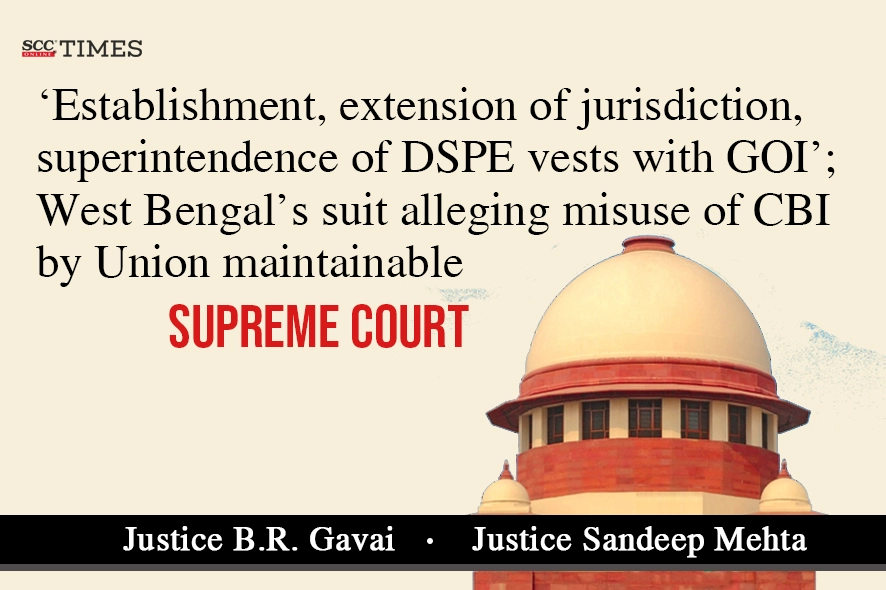Supreme Court: The State of West Bengal filed an original suit, seeking, inter alia, declaration that registration of cases by the Central Bureau of Investigation (CBI) after withdrawal of Notification under Section 6 of the Delhi Special Police Establishment (‘DSPE’) Act, 1946 is unconstitutional, and restrain CBI from registering and/or investigating a case committed within the territory of the State after the consent under Section 6 of the DSPE Act by the State was withdrawn. Regarding the maintainability of the suit, the Division Bench of BR Gavai* and Sandeep Mehta, JJ. held that the said suit was maintainable and rejected the Union’s contentions on the same, holding that the State’s plaint did disclose cause of action.
Maintainability of the Suit- Averments in the Plaint
The Union of India raised preliminary objections as to the maintainability of the suit. The Court reiterated that for considering the preliminary objections, only the averments made in the plaint are to be looked into to determine as to whether a cause of action has been made out or not. The Court perused the plaint and noted that it avers that Entry 80, List I, ensures that the Union does not transgress into the jurisdiction of the State without permission of the State concerned, therefore the CBI which draws its powers from the DSPE Act had acted in violation of the Constitutional provisions as also the DSPE Act. Reference was also made to Section 6 which requires the consent of the Government of the State concerned in whose areas the jurisdiction of the CBI is being extended, and averred that the same is component of the concept of federalism. The Court noted that it was also submitted that, in case the defendant is allowed to operate its own police force within the State in the absence of previous approval of the State, the State will suffer grave constitutional prejudice.
Does Union of India have no superintendence or control over the CBI?
The Court on perusal of Section 2 and 3 of the DSPE Act said that the DSPE is entitled to investigate only such offences or classes of offences which are specified by the Central Government by issuing a notification in the official gazette. The Court also noted that Section 5(1) of the DSPE Act would reveal that the Central Government, by an order, can extend to any area including Railway areas in a State, not being a Union Territory, the powers and jurisdiction of members of the DSPE for the investigation of any offences or classes of offences specified in a notification under Section 3 of the DSPE Act. The Court stated that, for extending such powers under Section 5 of the DSPE Act, it cannot be done without the consent of the Government of that State under Section 6 of the DSPE Act. The Court said that the entire scheme of the DSPE Act reveals that right from the constitution of the special police force, the DSPE, issuance of notifications specifying the offences or classes of offences which are to be investigated, superintendence and administration of DSPE and the extension of powers and jurisdiction of DSPE to the areas beyond the Union Territories, it is the Central Government which is vitally concerned with the same. Hence, the Court viewed that the Union’s contention that even if the CBI, being an independent agency, is considered to be an instrumentality of the State under Article 12 of the Constitution, it cannot be equated to the term Government of India as contemplated under Article 131 of the Constitution, holds no water. The Court held that the very establishment, exercise of powers, extension of jurisdiction, the superintendence of the DSPE, all vest with the Government of India.
“The CBI is an organ or a body which is established by and which is under the superintendence of the Government of India in view of the statutory scheme as enacted by the DSPE Act.”
However, the Court viewed that the powers of superintendence of the Central Government would not relate to the superintendence of investigation of a particular case and the CBI would always be entitled to investigate the offences independently, but his does not negate that the administrative control and superintendence of the DSPE vests with the Central Government.
“Subject to the provisions of this Constitution” under Article 131 of the Constitution
The Court said that Article 131 of the Constitution is a special provision which deals with the original jurisdiction of the Court in case of a dispute between the Federal Government and the State Governments. The words “subject to the provisions of this Constitution” will have to be considered in the context, that a special provision has been made for deciding the question on which the existence or extent of a legal right between the special parties mentioned in the provision has been provided. The Court stated that the jurisdiction under Article 131 of the Constitution would only be subject to any other provision in the Constitution which provides for entertaining a dispute between the parties mentioned therein. Hence, a remedy under Article 131 of the Constitution is a special remedy available only to the parties and for the purpose mentioned therein. Conclusion
Therefore, the Court rejected the contentions raised by the Union. The suit was listed for 13-08-2024 for framing of issues.
CASE DETAILS
|
Citation: Appellants : Respondents : |
Advocates who appeared in this case For Petitioner(s): For Respondent(s): |
CORAM :









